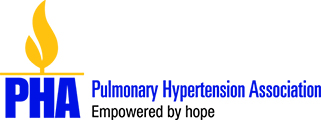The diagnosis of pulmonary hypertension (PH) is overwhelming in patients’ and caregivers’ lives. It also can prove challenging to health care professionals new to the field. Before health care professionals were experts, they were studying and training underneath their mentors to learn quality patient care and implement best practices. The Pulmonary Hypertension Association’s (PHA) PH Professional Network (PHPN) Mentor Program was created to fill this gap between trainees and specialists. The program’s goal is to connect new non-physician clinicians working with PH patients with qualified peers who can provide professional mentorships. Mentees can seek general guidance and advice, as well as mentorship on a variety of topics, including clinical practice experiences, research activities, managing work-related stress and obtaining Centers of Comprehensive Care (CCC) or Regional Clinical Program (RCP) accreditation.
Melissa Morrison, D.N.P. wanted to help improve her institution’s program prior to its PH Care Centers (PHCC) review when she applied for Atlanta’s Northside Hospital’s PH program. As the PH coordinator at Northside Hospital, her team was seeking the RCP designation so that it could offer care to additional patients in Atlanta and the surrounding areas. “I was looking for a mentor who had the same credentialing as me,” said Morrison. “I felt that was really important as our job descriptions would be similar. I also was looking for a mentor who had been through the certification process.”
The PHPN Communications Committee had the perfect mentor in mind for Morrison. Martha Kingman, D.N.P., FNP-C, is an outpatient nurse practitioner at University of Texas Southwestern, a PHCC CCC. Kingman is heavily involved in routine follow-up care of PH patients, review of new referrals, sub-investigator for multiple clinical trials and teaches a quarterly PH class for inpatient nurses.
Throughout their mentor-mentee relationship, Kingman and Morrison discussed Morrison’s goals as a coordinator, areas that needed improvement and ways to get involved with PHA. “I think the most important knowledge to have as a mentee would be knowing who to contact for questions; for instance, knowing how to utilize the PHPN listserv and other resources PHPN has to offer,” Kingman said. With this mentorship and other implementations, Northside Hospital was accredited in September as a PHCC RCP. It is one of 58 centers across the country that are accredited for quality care of PH patients.
Morrison and Kingman’s relationship is just one of several mentor-mentee relationships that the PHPN Communications Committee has connected. As PH gains recognition among health care professionals, the committee hopes to keep connecting peers and educating the future of PH-treating professionals.
To become a part of this rewarding and career-building experience, apply today to become a PHPN mentor or mentee.







